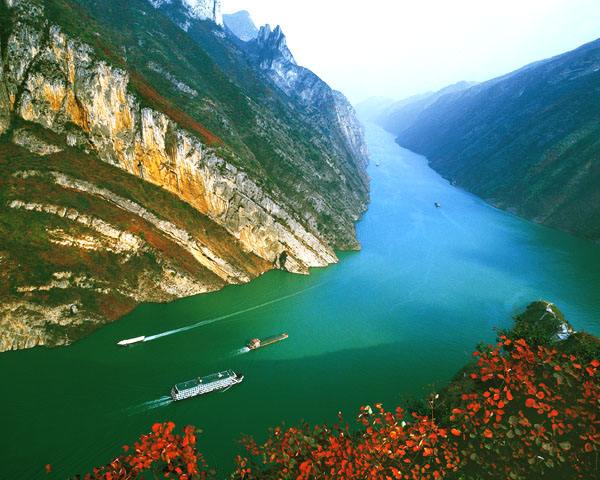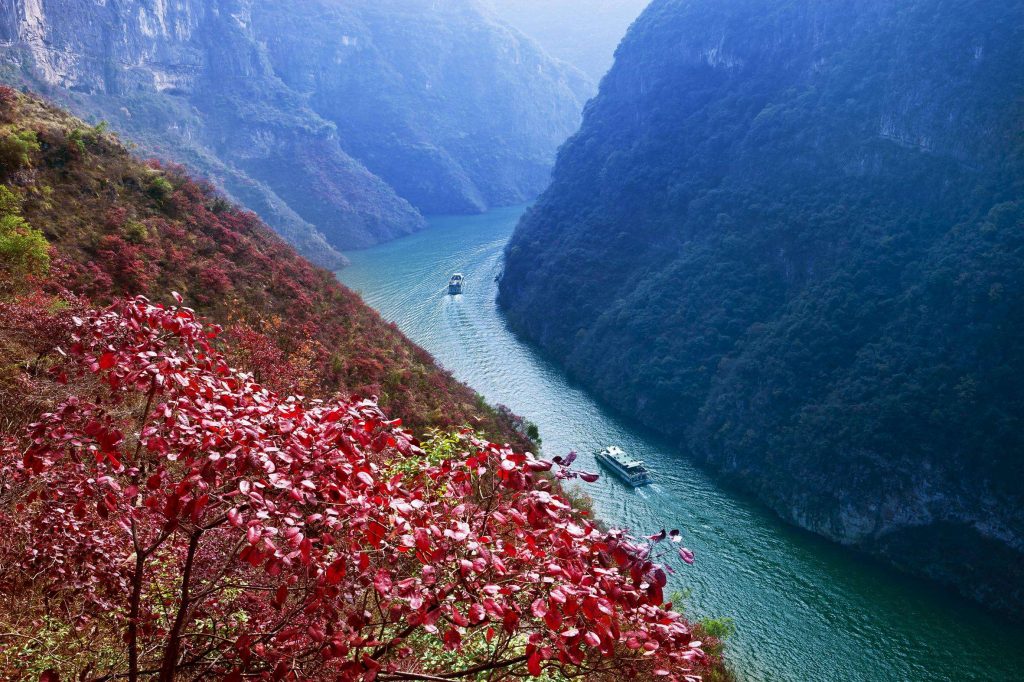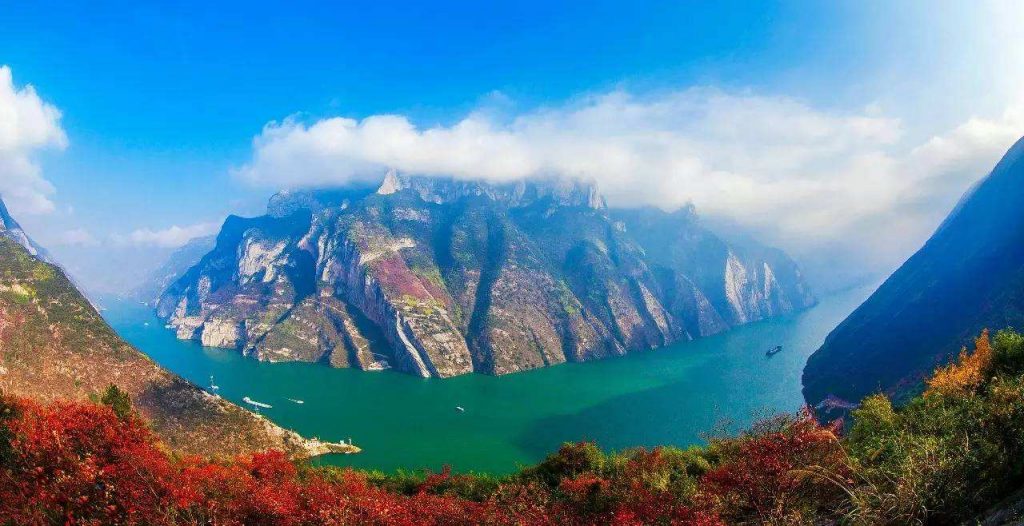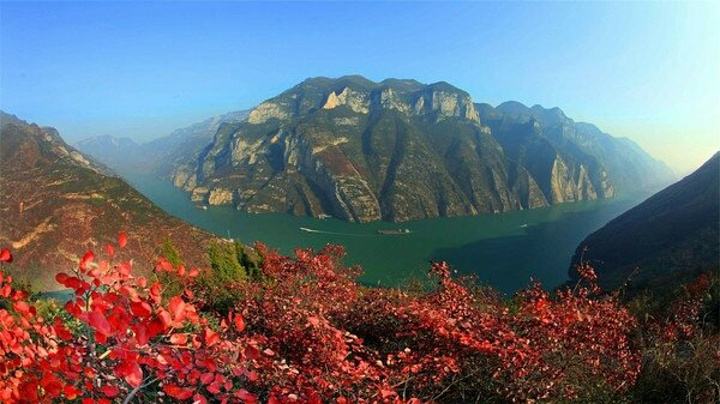Three Gorges
9 min read“The ages have been at work on it(the Canyon).”-Theodore Roosevelt Having coursed through numerous high mountains and deep valleys and received the tributaries of Minjiang River,Tuojiang River,Jialing River and Wujiang River,the mighty Yangtze River,with large amount of water added,roars eastward from Sichuan Basin.After passingWan’an County of Sichuan province,the mountains along the river began to approach each other.With Wushan Mountain standing in its way and obstructing its passage,the Yangtze River,with enormous energy,still rushes for-ward and splits the high mountains apart like a sharp axe.
Cutting through Wushan Mountain and flushing its way eastward,the Yangtze River makes the dangerous and spectacular Three Gorges.
Three Gorges of the Yangtze River is the general name of Qutang Gorge,Wuxia Gorge and Xiling Gorge,where the section of the Yangtze River is also called Xia-jiang River(Gorge River).Three Gorges is one of the biggest canyons in the world,with spectacular sceneries.

At narrow places, the combination of narrow canyon a-mong high mountains and turbulent currents are really soul-stirring; however, at the wide valleys, with green trees on the two sides, the broad river and slow current make people feel comfortable allover.
The first gorge of the three, along the way the Yangtze River flows, is Qutang Gorge. Qutang Gorge is famous for its grandeur and spectacle, with famous places of interest being found everywhere in it. However, with the completion of river damming of the Three Gorges Pro-ject, the scene that”it is hard to describe the mountains along Qutang Gorge, even with ten thousand of exquisite pens”is no longer in existence but only appears in people’s memories. On the south side of Qutang Gorge, there used to be a”MengLiang Staircase”on the cliff, which is an upward zigzag line of square holes cut into the cliff by someone, like a staircase leading to the heaven when looking up.
The legend says that Gen-eral Yang Linggong of the Northern Song dynasty (960-1127) was framed up by some sycophantic courtier and died, and he was buried on the top of that clif.A The sceneryof Qutang Gorge loyal general under him, Meng Liang, felt very grievous and indignant about his death and decided to find General Yang’s remains and bury him at his native place. Under the cover of the shades, Meng Liang went to the foot of thecliff by boat every night and cut holes on it. He wanted to cut a laddered staircase to the top of the cliff. However, when Meng Liang cut half way up, he was discovered by an old monk. The monk aped the crowing of a cock, which caused the crowing of all the cocks in the nearby Baidi city. Meng Liang, being discovered, had to leave in a hurry and all the work done before was in vain. However, it is only a legend out of people’s yearn for the hero Yang Linggong. In fact,”Meng Liang Staircase”is the relic of ancient people building plank road along the cliff.
In the west mouth of Qutang Gorge, there is the an-cient Baidi City (the White King City). In the late Western Han dynasty (206 BC-220 AD), an able man called Gong-sun Shu gathered crack troops and intended to seize con-trol of the country. He took a liking to the strategic posi-tion of Shu region and settled down there. It is said that at that time he saw an ancient well in the city in which gush-es of water vapor rose and soared to the sky in the shape of a white dragon(the dragon was a symbol of the emperor in feudal China). Gongsun Shu believed that it was an aus-pice, foretelling that he would become the emperor in the future. Therefore, he called himself Baidi(White King) and built Baidi City.

“Entrusting custody of the prince to Zhuge Liang in Baidi City”is a very famous story. In the Three Kingdoms Period (220-280), Liu Bei went on an expedition to sup-press the Wu state but was defeated, and they withdrew toBaidi City. Liu Bei fell ill and was dying, so he entrust-ed custody of the prince to Zhuge Liang. Liu Bei told Zhuge Liang,”If the prince has the ability of being a king, then please try your best to assist him in governing the country; if not, be the king yourself.”Hearing this, Zhuge Liang cried out and kneeled down, promising to whole-heartedly assist the prince to the end of his life, sparing no efforts. And he vowed that he didn’t have any idea of be-ing the king himself. From then on, Baidi City became more famous because of this widely praised story. After the implementation of the Three Gorges Pro-ject, the water level of Qutang Gorge rose and Baidi City, the city submerged in poems, became a small island in the Yangtze River.
At the east mouth of Qutang Gorge, the archaeolo-gists have unearthed large amounts of pottery pieces, stoneware, bone articles etc., proving that in Matriarchic communes period in the Neolithic Age the human inhabi-tation sites here had reached a certain size, and had formed the fairly developed Daxi Culture.
Somber and beautiful Wuxia Gorge is the second one of Three Gorges. Along the river stretch forest covered mountains with precipitous cliffs, which rise almost per-pendicularly, and are backed here and there by lofty andfantastic peaks. The watercourse meanders and winds, and turns when one doubts if there are ways in front, where a totally different world present itself before the eyes, beau-tiful and silent. In Wuxia Gorge there are 12 high peaks for which “cloud is the clothes and rain the skirt”. The most gorgeous one is the storied Shenni Peak(Goddess Peak).
The legend tells that there was a bright girl called Shenni
Wuxia Gorge
in a village near the Yangtze River, who was also very beautiful and graceful. She was in love with a young man surnamed Chen in the village. Coveting her beauty,a local despot in the village led several men to break into the home of Shenni and carried her away by force. Shennii was locked in an empty house, but she managed to run away. After the local despot found it out, he led his rough-necks to chase her. Shenni tried to hide herself but failed, and finally she was forced to the mountain peak with no way to escape. Facing the coercion, Shennti would rather die than submit, so she jumped down the bottomless abyss.
The parents of Shenni cried with extreme sadness and pain, and her lover was even more overwhelmed. The deep love moved the Jade Emperor, and he ordered the Grand White Star (a god in the heavenly court) to recall the soul of Shenni and allowed her to appear on the mountain peak on the 15th of August each year to meet her lover and par-ents. Without knowing how many years passed, Shenni ecame a rock standing on the mountain peak. This sadbut beautiful story was passed on, and the peak where Shenni stands was therefore named Shenni Peak.
After Wu Gorge, there are the talus piles and rapids of Xiling Gorge, which is the longest of Three Gorges and full of dangerous shoals and reefs. In the gorge there is a Bingshu-Baojian Gorge (“Military Book and Sword Gorge”). On the cliff of the north bank, there are severalsquare rocks piled together in a regular way, just like a book; below these rocks there is a raised rock, like a sharp sword inserted in the water. The name of the gorge is in-deed very interesting; however, the story is much more so.

It is said that Zhuge Liang wrote his military tactics of all his life into a book, but he couldn’t find anybody to im-part, so he put the book of tactics on the cliff of XilingGorge, which could only be taken by the able man of after-time. It was later proved that the so-called “book of tac-tics”in fact was the relic of cliff burial of ancient people.
In the gorge there is another famous scenic spot-Huangniu Rock (Yellow Ox Rock), which resembles a fresco composed of rocks of two colors, yellow and black.
About its history, there is also a legend. In the remote an-tiquity, Dragon King of the East Sea sent twelve evil drag-ons to become twelve mountains and obstruct the Yangtze River at Xiling Gorge. Without ways out, water in the Yangtze River got out of the watercourse and brought dis-aster to the people. In order to help people get out of the disaster, Yu the Great worked day and night to control the water. Being too busy, he didn’t return home for many years and even didn’t drop in when he passed his home for three times. The Goddess of Wushan Mountain, moved by Yu’s perseverance and determination, sent a yellow ox with magical power to help Yu. Upon the arrival at Xiling Gorge, the yellow ox gored the mountains apart with its sharp horns, thereat the Yangtze River water flowed nor-mally again and the flood problem was also solved. Be-cause of his contribution, Yu the Great became a god. He wanted to bring the yellow ox to the heaven together; how-ever, the yellow ox would rather remain on the earth. It jumped onto the cliff and became a rock in order to calm the Yangtze River water. People in later time even built ashrine for it in order to commemorate the contribution of the yellow ox.
In the wide valley near Xiling Gorge, there also have come forth two widely applauded historic figures-Qu Yuan and Wang Zhaojun. Qu Yuan grew up at the side of beautiful Xiling Gorge. All his life was full of setbacks, and although he cherished high ideals, he didn’t meet any-body who could help him to realize. He was noble and loyal but was framed up by base person. Feeling too disap-pointed about the fatuity of the emperor and corruption of the society, he drowned himself in the river. Qu Yuan was a great patriotic poet, who wrote the immortal poems like Li Sao(Encountering Sorrow), Tian Wen(Asking the God). Making extraordinary achievements, Qu Yuan occupied in the history of Chinese literature an important position. The traditional festival of Duanwu in China is also originated from the commemoration of Qu Yuan.
Wang Zhaojun, one of the Four Beauties of ancient China, was born in a village beside a limpid brook in Xil-ing Gorge. She not only has the stunning beauty of “fish sinking and birds alighting”, but was also bright and quick-witted. After she grew up, she was even more beau-tiful and was selected into the palace to be a maid of hon-or. At that time, the Western Han dynasty (206 BC-220 AD) attempted to appease the wars with Xiongnu and achieve peace through political marriage. None of the girls was willing to marry so far to the remote Xiongnu except Wang Zhaojun, who stood out initiatively. For the sake of peace between the two peoples and the stable life of com-mon people, she married to the faraway Xiongnu. She made great contributions to the peace and friendship be-tween Han and Xiongnu, and was greatly praised by gener-ations of people.

At the east section of Xiling Gorge, after a short canyon, there reaches the”bottleneck”at the most east of Three Gorges-Nanjinguan Pass. Nanjinguan Pass is very narrow, like a narrow bottleneck that strangles the river. Its strategic terrain with difficult access has always been the bone of contention among warring strategists. Passing through Nanjinguan Pass, one can see an arc of rainbow-Gezhou Dam, which sits astride the Yangtze River. Now on the Yangtze River there is one more water conservancy project that benefits people together with Gezhou Dam. In 14th December,1994, the largest key wa-ter-control project-Three Gorges Project began officially, which was an unprecedented feat. This project has enor-mous and comprehensive effects like flood-control, power generation, and navigation. When completed, Gezhou Dam will add a heavy and powerful stroke in the human history of water conservancy projects.



